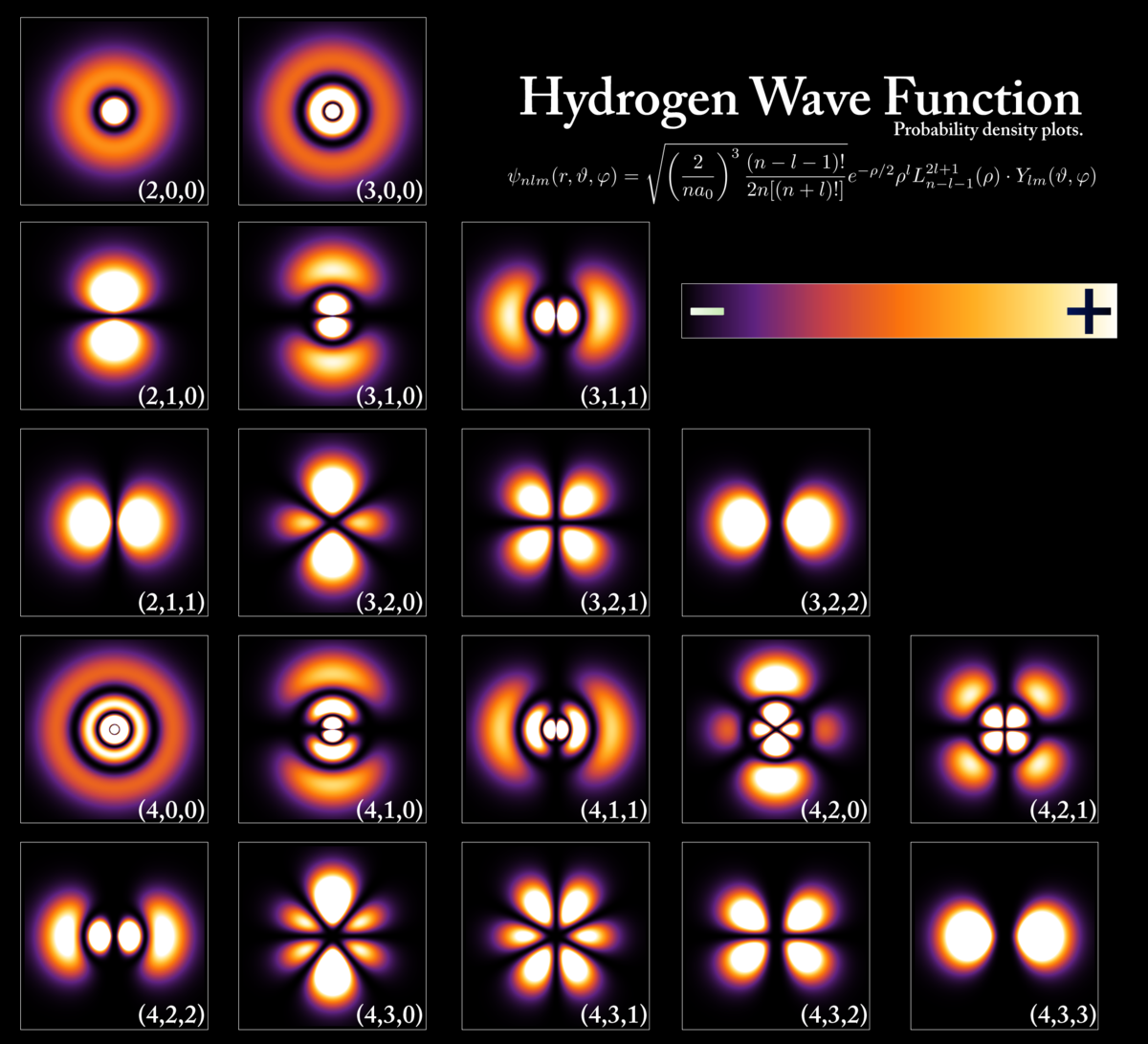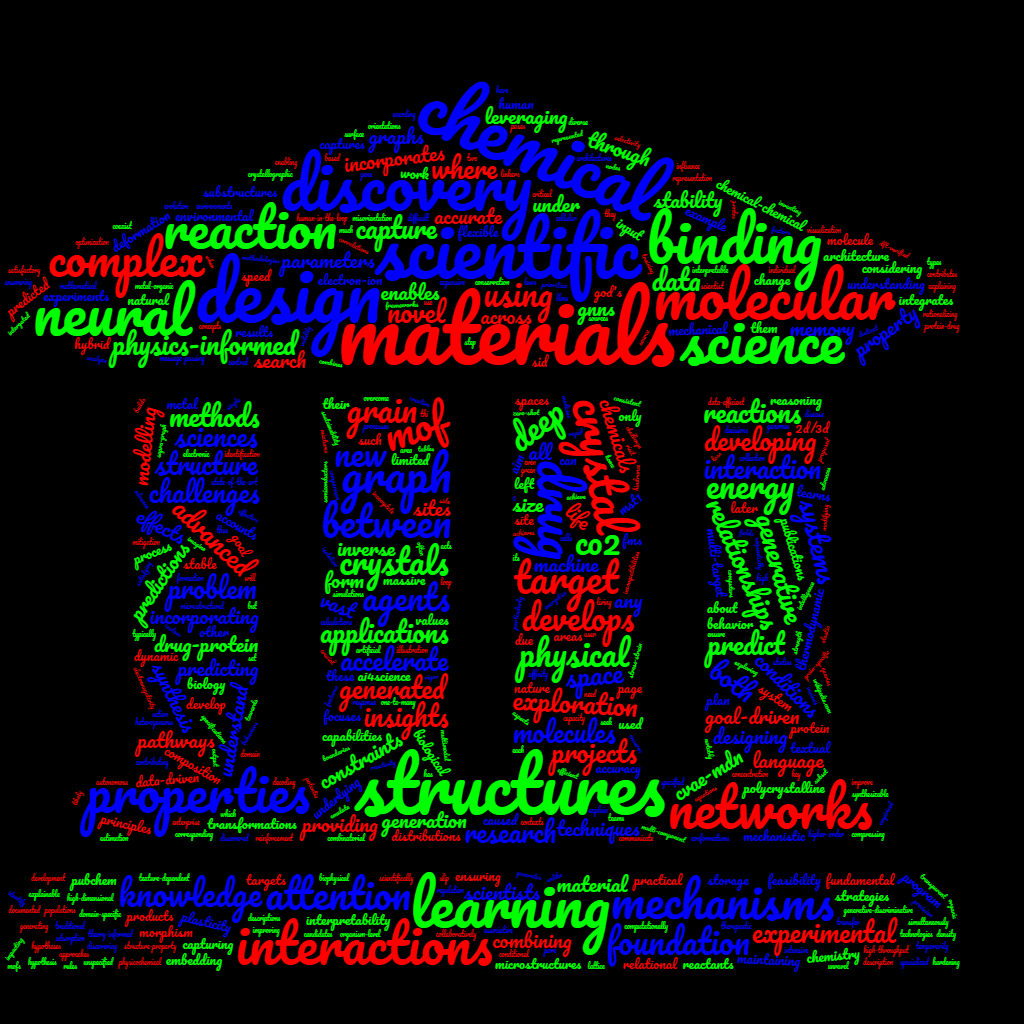
(Source: wikipedia.com)
Home
Projects
Grants
Talks
Popular writings
Theses
Publications
Artificial Intelligence for Science
This research program aims to develop AI to automate the expensive discovery loop and bring science into AI models.
| |
|
Aims
Please visit the Projects page for the latest update. |  |
We design autonomous agents to
emulate the scientific process, combining creative exploration with
systematic reasoning. These agents imagine hypotheses, design
experiments, analyze results, and communicate findings like human
scientists. Operating in vast design spaces, they employ goal-driven
exploration strategies while maintaining scientific rigor. The agents
work collaboratively in teams with humans, incorporating expert advice,
rationalizing decisions, and explaining scientific concepts in natural
language. Their architecture integrates multiple AI capabilities:
causal reasoning, experimental design, hypothesis generation, and
natural language interaction. This human-in-the-loop approach ensures
both innovation and practical relevance while maintaining
interpretability and scientific validity.
Publications
Physical Sciences
The goal is to understand
fundamental principles of nature to accelerate scientific discovery
across multiple physical domains. By developing advanced AI methods, we
aim to replace computationally intensive calculations and reduce costly
experiments in areas like quantum chemistry, molecular design, and
materials science. Our framework addresses key challenges: predicting
molecular properties and interactions, simulating chemical reactions,
optimizing synthesis pathways, understanding material structures,
discovering novel alloys, and generating new molecules and crystals.
The research particularly focuses on urgent applications in energy
storage and carbon capture technologies, contributing to broader
challenges in green energy, climate change mitigation, and
environmental sustainability.
Publications
Life Sciences
The goal is to understand God's plan for
living systems
by decoding the complex relationships within genomes, cells, and
organisms. Through advanced AI methodologies, we aim to unravel the
underlying mechanisms of life processes, from gene regulation to
cellular behavior and organism-level interactions. Our research focuses
on developing novel machine learning approaches to accelerate drug
discovery, combining insights from genomics, proteomics, and systems
biology. By modeling biological pathways, protein-drug interactions,
and disease mechanisms, we seek to identify promising therapeutic
targets and design effective treatments. This work contributes to
advancing precision medicine and improving human health through
data-driven biological understanding.
Publications
- New biomarkers for abdominal aortic aneurysm ($1M), MRFF Cardiovascular Health Mission, 2023-2026.
- Optimising treatments in mental health using AI ($5M), MRFF AI in Health, 2021-2026.
- Studying and developing advanced machine learning based models for extracting chemical/drug-disease relations from biomedical literature”, ($54K), Vietnam NAFOSTED, 2017–2018.
- Building a simulator of mail sorting machine, ($12K), PTIT VN, 2003.
- AI4Science: The 5th paradigm, Invited talk @Los Alamos National Laboratory, USA, Sept 2025.
- AI4Science, Talk @TDTU HCM City, July 2025.
- The 5th paradigm of scientific discovery, Talk @VNU Hanoi, March 2025.
- Physics, mind and AI, Bronze Bragg Lecture, Adelaide, Feb 2025.
- The 2024 Nobel Prize in Physics, Public lecture @VNU-HUS HN, Dec 2024.
- AI4Science: A research program, Talk @Deakin, Nov 2024.
- Generative AI to accelerate discovery of materials, Keynote @PRICM11, Nov 2023.
- AI
for automated materials discovery via learning to represent, predict,
generate and explain, @Thuyloi University,
May 2023.
- Machine learning and reasoning for drug discovery Tutorial @ECML-PKDD, Sept 2021.
- Climate
change: Challenges and AI-driven solutions, @Swinburne Vietnam,
Hanoi,
Vietnam, Dec 2019.
- Modern AI for drug discovery, VietAI Summit, Nov 2019.
- Lecture on Deep learning for biomedicine, Southeast Asia Machine Learning (SEA ML) School, Depok, Greater Jakarta, Indonesia, July 2019.
- Deep learning for genomics: Present and future, Genomic Medicine 2019, Hanoi, Vietnam, June 2019.
- AI for matters, Phenikaa University, Hanoi, Vietnam, Jan 2019.
- Deep learning for biomedicine: Genomics and Drug design, Institute of Big Data, Hanoi, Vietnam, Jan 2019.
- Deep learning for biomedical discovery and data mining, Tutorial at PAKDD'18, Melbourne, Australia.
- The 2024 Nobel Prize in Physics, Truyen Tran, Medium, Feb 2025.
- The
dynamics of knowledge, Truyen
Tran, Medium,
October 2024.
- AI, math, medicine, software, and the sciences: A shifting landscape, Truyen Tran, Medium, August 2024.
Theses
- Long Tran (PhD, with Dr Phuoc Nguyen), Causal inference, 2024-.
- Dat Ho (PhD, with Dr Shannon Ryan), PIML for breakup mechanics, 2024-.
- Linh La (PhD, with Dr Sherif Abbas), Physics-informed ML for materials, 2024-.
- Minh-Thang Nguyen (PhD), Knowledge-guided machine learning, 2023-.
- Tri Nguyen (PhD, with Dr Thin Nguyen), Decoding the drug-target interaction mechanism using deep learning, 2019-2022. Nominee of Deakin's Thesis Award 2022.
- Kien Do (PhD), Novel deep architectures for representation learning, 2017-2020.
- Trang Pham (PhD), Recurrent neural networks for structured data, 2016-2019.
Preprints
- Hybrid generative-discriminative models for inverse materials design, Phuoc Nguyen, Truyen Tran, Sunil Gupta, Svetha Venkatesh. arXiv preprint 2019 arXiv:1811.06060.
- Improving Disordered Crystal Modeling with Nonlinear Atomic Embedding for Superconducting Materials, Tri Minh Nguyen, Hai Nam Le, Sherif Abdulkader Tawfik, Truyen Tran, Sunil Gupta, Svetha Venkatesh, ChemRxiv. 2025; doi:10.26434/chemrxiv-2025-6x083.
- Robust SDE Parameter Estimation under Missing Time Information Setting, Van Long Tran, Truyen Tran, Phuoc Nguyen, AAAI’26.
- Physics-informed Machine Learning for Medical Image Analysis, Chayan Banerjee, Kien Nguyen, Olivier Salvado, Truyen Tran, Clinton Fookes, ACM Computing Surveys, 2025.
- Learning structural causal models from ordering: Identifiable flow models, Minh Khoa Le, Kien Do, Truyen Tran, AAAI'25.
- MP-PINN: A Multi-Phase Physics-Informed Neural Network for epidemic forecasting, Thang Nguyen, Dung Nguyen, Kha Pham and Truyen Tran, in Proceedings of the 22nd Australasian Data Science and Machine Learning Conference (AusDM'24), Melbourne, Australia | 25-27 November 2024.
- Hierarchical GFlowNet for crystal structure generation, Nguyen, Tri, Sherif Tawfik, Truyen Tran, Sunil Gupta, Santu Rana, and Svetha Venkatesh. In AI for Accelerated Materials Design-NeurIPS 2023 Workshop. 2023.
- Learning to discover medicines, Nguyen, Minh-Tri, Thin Nguyen, and Truyen Tran. International Journal of Data Science and Analytics (2022): 1-16.
- Explaining black box drug target prediction through model agnostic counterfactual samples, Nguyen, Tri Minh, Thomas P. Quinn, Thin Nguyen, and Truyen Tran. IEEE/ACM Transactions on Computational Biology and Bioinformatics (2022).
- Variational hyper-encoding networks, P Nguyen, T Tran, S Gupta, S Rana, HC Dam, S Venkatesh, ECML-PKDD'21, 2021.
- Graph classification via deep learning with virtual nodes Trang Pham, Truyen Tran, Hoa Dam, Svetha Venkatesh, Third Representation Learning for Graphs Workshop (ReLiG 2017).
- Learning Recurrent Matrix Representation, Kien Do, Truyen Tran, Svetha Venkatesh. Third Representation Learning for Graphs Workshop (ReLiG 2017).
- The Stability and Electronic Structure of anti-MXenes, Linh La, Salvy Russo, Truyen Tran, Svetha Venkatesh, and Sherif Tawfik, The Journal of Physical Chemistry, Part C, 2025.
- Efficient symmetry-aware materials generation via hierarchical generative flow networks, Tri Minh Nguyen, Sherif Abdulkader Tawfik, Truyen Tran, Sunil Gupta, Santu Rana, Svetha Venkatesh, Digital Discovery, 2025.
- Impact of chirality on nanotube fracture strain: comprehensive machine learning potential calculations. Tawfik SA, Nguyen T, Tran T, Gupta S, Venkatesh S., Nanoscale, 2025.
- Early Cycle Life Prediction of Lithium‐Metal Batteries with the Aid of Machine Learning, Mojtaba Eftekharnia, Tri Nguyen, Maria Forsyth, Truyen Tran, Patrick Howlett, Robert Kerr, Batteries & Supercaps, 2025, DOI:10.1002/batt.202500261
- The search for superionic solid-state electrolytes using a physics-informed generative model, Tri Minh Nguyen, Sherif Abdulkader Tawfik, Truyen Tran, Sunil Gupta, Santu Rana, Svetha Venkatesh, Materials Horizons, 2025.
- Machine learning-integrated modeling of thermal properties and relaxation dynamics in metallic glasses, Ngo T. Que, Anh D. Phan, Truyen Tran, Pham T. Huy, Mai X. Trang, Thien V. Luong, Materials Today Communications, 2025.
- PID3Net: A Deep Learning Approach for Single-Shot Coherent X-ray Diffraction Imaging of Dynamic Phenomena, Tien-Sinh Vu, Minh-Quyet Ha, Truyen Tran, Hiori Kino, Yukio Takahashi, Adam Mukharil Bachtiar, Duc-Anh Dao, Shuntaro Takazawa, Nozomu Ishiguro, Yuhei Sasaki, Masaki Abe, Hideshi Uematsu, Naru Okawa, Kyosuke Ozaki, Kazuo Kobayashi, Yoshiaki Honjo, Haruki Nishino, Yasumasa Joti, Takaki Hatsui, and Hieu-Chi Dam, npj Computational Materials, 2025.
- Scale matters: simulation of nanoscopic dendrite initiation in the lithium solid electrolyte interphase using a machine learning potential, Tawfik, Sherif Abdulkader, Linh La, Tri Nguyen, Truyen Tran, Sunil Gupta, and Svetha Venkatesh, Journal of Materials Chemistry A, 2025.
- Embedding material graphs using the electron-ion potential: Application to material fracture, Tawfik, Sherif Abdulkader, Tri Minh Nguyen, Salvy P. Russo, Truyen Tran, Sunil Gupta, and Svetha Venkatesh. Digital Discovery, Oct 2024.
- Towards understanding structure–property relations in materials with interpretable deep learning, Tien-Sinh Vu, Minh-Quyet Ha, Duong Nguyen Nguyen, Viet-Cuong Nguyen, Yukihiro Abe, Truyen Tran, Huan Tran, Hiori Kino, Takashi Miyake, Koji Tsuda, Hieu-Chi Dam, npj Computational Materials, 9(215), (2023).
- Hierarchical GFlowNet for crystal structure generation, Nguyen, Tri, Sherif Tawfik, Truyen Tran, Sunil Gupta, Santu Rana, and Svetha Venkatesh. In AI for Accelerated Materials Design-NeurIPS 2023 Workshop. 2023.
- Machine learning-aided exploration of ultrahard materials, Tawfik, Sherif Abdulkader, Phuoc Nguyen, Truyen Tran, Tiffany R. Walsh, and Svetha Venkatesh. The Journal of Physical Chemistry C 126, no. 37 (2022): 15952-15961.
- Incomplete conditional density estimation for fast materials discovery, Phuoc Nguyen, Truyen Tran, Sunil Gupta, Svetha Venkatesh. SDM'19.
- Committee machine that votes for similarity between materials; Duong-Nguyen Nguyen, Tien-Lam Pham, Viet-Cuong Nguyen, Tuan-Dung Ho, Truyen Tran, Keisuke Takahashi and Hieu-Chi Dam. IUCrJ, 2018 Nov 1; 5(Pt 6): 830–840.
- Graph transformation policy network for chemical reaction prediction, Kien Do, Truyen Tran, Svetha Venkatesh, KDD'19.
- Graph memory networks for molecular activity prediction, Trang Pham, Truyen Tran, Svetha Venkatesh, ICPR'18.
- Neural reasoning for chemical-chemical interaction. Trang Pham, Truyen Tran, Svetha Venkatesh, NIPS 2018 Workshop on Machine Learning for Molecules and Materials.
- MP-PINN: A Multi-Phase Physics-Informed Neural Network for epidemic forecasting, Thang Nguyen, Dung Nguyen, Kha Pham and Truyen Tran, in Proceedings of the 22nd Australasian Data Science and Machine Learning Conference (AusDM'24), Melbourne, Australia | 25-27 November 2024.
- Learning to discover medicines, Nguyen, Minh-Tri, Thin Nguyen, and Truyen Tran. International Journal of Data Science and Analytics (2022): 1-16.
- Mitigating cold-start problems in drug-target affinity prediction with interaction knowledge transferring, Nguyen, Tri Minh, Thin Nguyen, and Truyen Tran. Briefings in Bioinformatics 23, no. 4 (2022): bbac269.
- Explaining black box drug target prediction through model agnostic counterfactual samples, Nguyen, Tri Minh, Thomas P. Quinn, Thin Nguyen, and Truyen Tran. IEEE/ACM Transactions on Computational Biology and Bioinformatics (2022).
- Personalized Annotation-based Networks (PAN) for the prediction of breast cancer relapse, T Nguyen, SC Lee, TP Quinn, B Truong, X Li, T Tran, S Venkatesh, TD Le, IEEE/ACM Transactions on Computational Biology and Bioinformatics, 2021.
- Deep in the bowel: Highly interpretable neural encoder-decoder networks predict gut metabolites from gut microbiome, V Le, TP Quinn, T Tran, S Venkatesh, BMC Genomics (21), 07/2020.
- DeepTRIAGE: Interpretable and individualised biomarker scores using attention mechanism for the classification of breast cancer sub-types. A Beykikhoshk, TP Quinn, SC Lee, T Tran, S Venkatesh, BMC Medical Genomics, 2020.
- Attentional multilabel learning over graphs: A message passing approach, K Do, T Tran, T Nguyen, S Venkatesh, Machine Learning, 2019.
- GEFA: Early fusion approach in drug-target affinity prediction, Tri Minh Nguyen, Thin Nguyen, Thao Minh Le, Truyen Tran, IEEE/ACM Transactions on Computational Biology and Bioinformatics, 2021.
- Attentional multilabel learning over graphs: A message passing approach, K Do, T Tran, T Nguyen, S Venkatesh, Machine Learning, 2019.